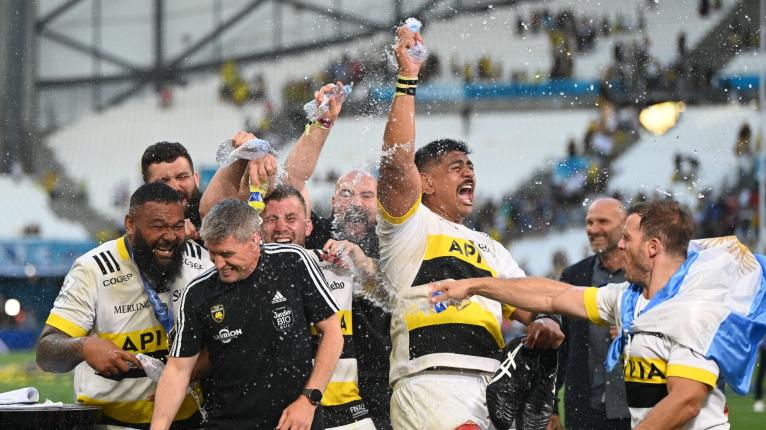The Gallagher Premiership in England has become one of the most entertaining leagues in the world since the last World Cup – of that there is no doubt. With the heavy yoke of relegation relieved and a new generation of referees establishing a crystal-clear, class-leading protocol at the breakdown, attacking play has flourished.
A new raft of younger, sprightly match officials overseen by Wayne Barnes collectively insist on removing the tackler from the equation before any pilfering activity can be rewarded, and it has led to a brighter, more colourful game than ever before.
In the current season, Premiership clubs are already averaging over 52 points and seven tries per game, even with a bleak mid-winter firmly in the rear-view mirror and the happy prospect of spring sunshine and harder pitches to come.
At the same time, both the salary cap and TV broadcasting deals have drifted into recession, with at least four clubs have feeling the financial pinch: Wasps and Worcester fell into administration, while both London Irish and Newcastle have moved uncomfortably close to the financial edge.
Crunch-time has arrived in European competition. Although the Exeter Chiefs managed the reach the semi-finals of the Heineken Champions Cup, the defeats suffered by the two top clubs in England, Saracens and the Leicester Tigers, were arguably both more significant and more representative. The Tigers were beaten heavily by Leinster in Dublin, 55 points to 24, and Sarries went down to La Rochelle 24-10.

Saracens have rebuilt on very sensible lines since the trauma of the salary cap scandal in 2019-2020 which dumped them in the punitive second-tier ‘dungeon’ of the Championship for a whole season. They shed several Test-quality imports, notably Springbok tight-head Vincent Koch and second rows George Kruis and Will Skelton in the process. Those two were good enough to force a Lions lock, Maro Itoje, back to number 6 in order to accommodate their talents.
That Saracens team was huge and physical and talent-deep throughout the squad, but it is not quite the same now. Saracens have changed their playing pattern to suit the shift in refereeing approach and the more limited material their tailor has to work with. They no longer kick automatically between the two 10-metre lines, but will regularly look to attack with ball in hand, using their back three from deep positions.
Take a look at the numbers. In the Premiership the league average for ball-in-play time is 38 minutes, and it is one minute higher for games involving the North Londoners. Saracens boast 20 minutes of active possession time and a ruck retention rate of over 96 per cent. In the Champions Cup, Saracens’ average ball-in-play drops to 35 minutes, their active possession time to 17-and-a-half minutes and their ruck retention rate to 92 per cent.
In the semi-final against La Rochelle, the figures were shaved even further: 33 minutes of ball-in-play and 16.9 minutes of active possession time, while the ruck retention rate collapsed to a lowly 80 per cent. You cannot build any attacking play if you are losing one breakdown out of every five that you set.
As the club’s Director of Rugby Mark McCall commented after the game, “They [La Rochelle] brought their best game today and we knew they would; after all, they are a great team and the European champions. If you want to play against them, you have to be incredibly accurate [at the ruck] and we weren’t.
The style of rugby which Saracens have espoused so successfully in the domestic 2022-2023 season, and which typifies the new expansive nature of the Gallagher Premiership as a whole, floundered on the hidden reef of a Top 14 opponent.
“The penalty count was a big issue for us, and we didn’t have the accuracy and precision you need against the very top teams. Their defence [at the breakdown] was also incredible.
“We had a lot of ball and a lot of times down their end without looking like we were going to score. They were very good at capitalising on any bit of field position they got.
“We’ve got five weeks until our home semi-final and we can learn a lot of lessons from today and work on them before then.”
The style of rugby which Saracens have espoused so successfully in the domestic 2022-2023 season, and which typifies the new expansive nature of the Gallagher Premiership as a whole, floundered on the hidden reef of a Top 14 opponent, and an Irish referee from the URC (Andrew Brace) who made more generous allowances for the defensive side at the breakdown.
Lower ball-in-play time suits La Rochelle’s massive tight forwards like 145-kilogram Uini Atonio and 140-kilogram Will Skelton admirably, and it was engineered by the home side’s ability to create no less than 15 outright turnovers or penalty stoppages at the defensive ruck.

Stade Rochelais are stacked to the gills with pilferers waiting for their chance to steal ball from the opposition after the tackle has been made. Hooker Pierre Bourgarit, lock Will Skelton, number 8 Greg Alldritt and tank-like inside centre Jonathan Danty are all out of the top drawer in that area of the game. And even they are not quite as good as the on-ball ‘black pearl’ that is Fiji’s Levani Botia.
Did Ronan O’Gara fret or sweat when La Rochelle signed Danty to play the No 12 spot at the end of the 2020-2021 season, the position already more than satisfactorily filled by Botia? Not one whit. He simply gave the 12 jersey to Danty and shifted Levani to the openside flank instead.
His presence gives the current European Champions a bristling wall of on-ball talent that is almost impossible either to breach up the middle, or run around on the edge. Let’s look at a few examples to explain just why that is the case:
This is La Rochelle’s first turnover, occurring less than one minute into proceedings. One of the main techniques employed against outstanding ‘jacklers’ of the ball is to run straight at them, forcing them to make a tackle instead. It is almost impossible to do both (tackling and jackaling) in the professional game.
But when Ben Earl runs straight towards Botia in order to engage him, before tipping the ball on to Mako Vunipola, the play lands Saracens in hot water:

Against Les Rochelais, avoiding one jackler more often than not means falling into the jaws of another – in this case Botia’s partner in back-row crime, number 8 Greg Alldritt.
It was a Gordian Knot Saracens struggled to untie, let alone cut throughout the game, and Levani Botia was the biggest beneficiary, winning no less than four turnovers on the deck:

In the first instance, Sarries fullback Alex Goode has the unenviable choice of cutting back toward either Botia or Jonathan Danty. He picks Danty, and that leaves the Fijian free to swoop in on the tackle ball. In the second example, wing Sean Maitland is faced by a solid wall of Alldritt, Skelton and Botia when he receives the ball. Botia dispossesses him with help from Skelton, overloading the cleanout by Nick Isiekwe and peeling him away from the real target.
Botia’s fourth turnover of the game was symbolic:
Botia makes the tackle after a break by Max Malins, evades the cleanout of Ivan van Zyl and stays on the ball long enough to win the inevitable penalty reward from Andrew Brace. Skelton just boulders the scrumhalf off the ball and stands there in triumph: La Rochelle had just done what they had been doing all game, winning the battle in the breakdown space and calling it ‘home’.
The conundrum for Saracens was compounded by the fact that both Danty and Botia were just as punishing in the act of making a tackle as they were in the post-tackle space:
As Saracens try to move the ball away from lineout, Botia sticks Owen Farrell on the first pass while Danty almost splits Jackson Wray in two on the second.
Just as La Rochelle benefited from the presence of two natural #7 experts on defence, so they profited from two experienced #12’s on the other side of the ball:

Levani is standing out with the backs, not in the two-forward screen ahead of him. He displays all of the instincts of a quality inside centre on the break, throwing the dummy and splitting a forward (Maro Itoje) away from a back (Farrell) before picking the scoring inside pass to scrum-half Tawera Kerr-Barlow.
The times they are a-changin’. Led by an excellent refereeing panel, the English Premiership is probably providing a better spectacle, and more value for money than at any other time in its history. At the same time, its clubs are struggling to keep their heads above water financially, and the methods which succeed so well domestically do not make the same impact in European competition.
The most successful English club of the last decade, Saracens are the prime example. Their heavyweight pack of international forwards, which not so long ago boasted as many as five second rows of international standard (George Kruis, Will Skelton, Maro Itoje, Nick Isiekwe and Joel Kpoku) was forced onto a slim-line diet after the salary cap fiasco, and Saracens have never regained their former strength-in-depth.
Sarries have traded up to a style featuring high ball-in-play, quick ruck speed and full use of the back three, even in attacks from their own end of the field. But at the sharp end of the competition, it is not quite the same. Confronted by a referee from outside their domestic league and La Rochelle’s frightful array of jackaling power, led by Fijian Levani Botia, their ruck retention crumbled. And there is the problem, in a nutshell: the rules of English rugby, on or off the field, do not apply to the rest of Europe, and it is in danger of being cast adrift – more of an island than ever before.


It seems like World Rugby should get all the referees to officiate like the Premiership referees.
I think that has largely occurred already S, Wayne Barnes is after all the most senior ref in the world now and rightly has input. The French refs are prob the biggest outlier, more laissez-faire at the BD!
There wasn't much supporting of body weight and/or hands straight to the ball in most of those turn overs. As ND says disappointing direction for rugby to go in
There was a time when the Pro was easily the fastest comp in the Northern Hemisphere but their refs are miles behind the English now. Assume Brace position!
A lot of it sheer repetition MP. Teams like La Roche are capable of competing at so many rucks that they know the ref will give them benefit of the doubt eventually!
Excellent read, thanks Nick, the world of the offensive ruck cleaner is back
Will make for some interesting RWC selections
It does vary from one comp to another H, but overall the trend is a positive one.
Ah disappointed to read this Nick. I've been reading your articles about the style of refereeing coming out of the UK with great optimism that it might be a world rugby backed effort and spread internationally. The breakdown these days feels like such a mess and the critical few moments of chaos that gets allowed really impacts the flow in attack.
Unfortunately to win a world cup, up can't hold it against any team to focus on making that mess at breakdown standard. But it won't be much fun to watch.
Well as much fun...
I think that most of the Prem sides would tell you what a diff they have experienced in the reffing of European comps ND. There is a huge amount of pressure exerted, not least on the ref him or herself.
But the positives are that the 'English' standards are prob more prevalent at Test level than they are on the level below!